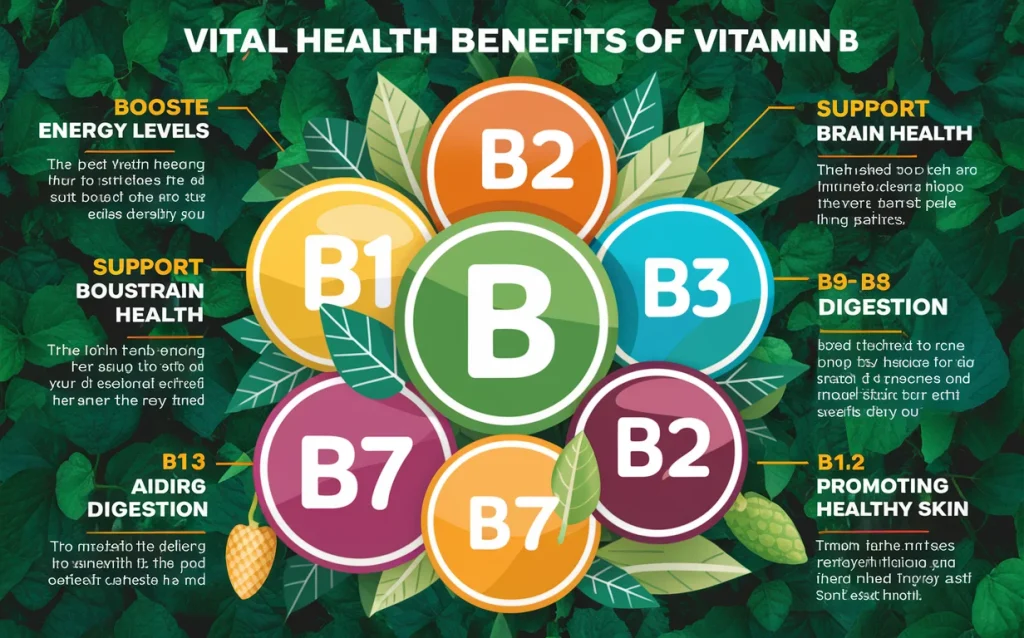Vitamin B complex is a group of essential nutrients that play a crucial role in maintaining overall health and well-being. Consisting of eight B vitamins, including thiamine (B1), riboflavin (B2), niacin (B3), pantothenic acid (B5), pyridoxine (B6), biotin (B7), folate (B9), and cobalamin (B12), this powerhouse complex offers numerous benefits for the body and mind.
Vitamin B complex is known for its ability to support energy production by aiding in the metabolism of carbohydrates, proteins, and fats. It helps convert food into usable energy, providing a natural boost to combat fatigue and promote vitality. In addition to its energy-boosting benefits, vitamin B complex also plays a crucial role in brain function, helping to improve memory, enhance cognitive performance, and maintain a positive mood. It supports the nervous system, promoting healthy nerve signaling and reducing the risk of neurological conditions.
But the benefits of vitamin B complex don’t stop there. It also contributes to healthy skin, hair, and nails, helping to maintain their strength and appearance. Vitamin B complex is crucial for the production of red blood cells, which carry oxygen throughout the body, supporting cardiovascular health. It also aids in the synthesis of DNA and RNA, essential for cell growth and repair. In addition, vitamin B complex has been linked to a reduced risk of certain birth defects during pregnancy, making it vital for expectant mothers.

Key Takeaways:
- Vitamin B complex is a group of essential nutrients that includes eight B vitamins.
- It supports energy production, brain function, and promotes a positive mood.
- Vitamin B complex helps maintain healthy skin, hair, and nails.
- It supports cardiovascular health and aids in the production of red blood cells.
- Vitamin B complex is crucial during pregnancy to reduce the risk of birth defects.
Importance of Vitamin B for Overall Health
Vitamin B plays a crucial role in maintaining overall health and vitality. With its numerous functions in the body, vitamin B is essential for various biological processes. From aiding in metabolism to supporting the nervous system, vitamin B ensures the proper functioning of different bodily systems.
One of the primary functions of vitamin B is its role in energy production. It helps convert the food we consume into usable energy, allowing our bodies to function optimally. Furthermore, vitamin B supports the nervous system by promoting the healthy development and maintenance of nerve cells.
Additionally, vitamin B is vital for maintaining healthy skin, hair, and nails. It contributes to the production of collagen, a protein that provides structure and strength to these tissues. Vitamin B also aids in the absorption of other nutrients, ensuring that our bodies receive the necessary vitamins and minerals for overall well-being.
Vitamin B plays a crucial role in energy production, nerve function, and the health of skin, hair, and nails.
Furthermore, some specific types of vitamin B provide additional health benefits. For example, vitamin B6 is involved in the production of neurotransmitters, which are essential for brain function and mood regulation. Deficiencies in vitamin B6 can lead to cognitive impairments and mood disorders.
In summary, the importance of vitamin B for overall health cannot be overstated. Its various functions, ranging from energy production to nervous system support, make it an indispensable nutrient for maintaining vitality and well-being. To ensure adequate intake of vitamin B, it is essential to include a diverse range of vitamin B-rich foods in your diet or consider supplementation if necessary.
Functions of Vitamin B in the Body:
- Aiding in metabolism
- Supporting the nervous system
- Promoting healthy skin, hair, and nails
- Contributing to the production of neurotransmitters
- Aiding in nutrient absorption
| Vitamin B Type | Main Functions | Food Sources |
|---|---|---|
| Vitamin B1 (Thiamine) | Converts food into energy Supports nerve function | Pork, whole grains, nuts, legumes |
| Vitamin B2 (Riboflavin) | Aids in energy production Promotes healthy skin and vision | Dairy products, eggs, leafy green vegetables |
| Vitamin B3 (Niacin) | Converts food into energy Supports digestive system | Meat, poultry, fish, mushrooms |
| Vitamin B6 | Involved in brain function Assists in red blood cell production | Poultry, fish, bananas, chickpeas |
| Vitamin B12 | Supports red blood cell production Aids in nerve function | Meat, fish, dairy products |
Key Benefits of Vitamin B Complex
The importance of vitamin B complex cannot be overstated. This essential group of vitamins consists of eight different B vitamins that play a crucial role in maintaining overall well-being. From boosting energy levels to supporting brain function and cardiovascular health, vitamin B complex offers a wide range of benefits.
Improved Energy Levels:
Vitamin B complex is known for its ability to enhance energy levels. It plays a vital role in converting the food you eat into energy that your body can use. This process, known as metabolism, is essential for maintaining optimal energy levels throughout the day. By including vitamin B complex in your diet, you can combat fatigue and enjoy increased energy and vitality.
Enhanced Brain Function and Memory:
Vitamin B complex is a key player in brain health. It supports the production of neurotransmitters, which are essential for sending signals between brain cells. By ensuring an adequate intake of vitamin B complex, you can improve cognitive function, boost memory, and enhance overall brain health.
“Vitamin B complex plays a vital role in brain health, supporting cognitive function and memory.”
Mood Boost and Stress Reduction:
One of the significant benefits of vitamin B complex is its positive impact on mood and stress levels. B vitamins, such as B6 and B12, are involved in the production of mood-regulating neurotransmitters like serotonin and dopamine. Adequate levels of these neurotransmitters contribute to better mood and reduced stress levels.
Supports Cardiovascular Health:
Vitamin B complex plays a crucial role in maintaining a healthy heart and cardiovascular system. B vitamins, including B3 (niacin) and B6, help regulate cholesterol levels, lower blood pressure, and reduce the risk of heart disease. By incorporating vitamin B complex into your lifestyle, you can support a healthy heart and reduce the risk of cardiovascular complications.
Aids in Red Blood Cell Production:
Vitamin B complex is essential for the production of red blood cells, which transport oxygen throughout the body. B vitamins, particularly B12 and folate, are necessary for red blood cell synthesis. Insufficient levels of these vitamins can lead to anemia, resulting in fatigue, weakness, and other health issues.
By ensuring an adequate intake of vitamin B complex, you can support the production of red blood cells, maintain healthy oxygen levels in the body, and prevent anemia.
In summary, vitamin B complex offers numerous benefits, including improved energy levels, enhanced brain function and memory, mood boost and stress reduction, support for cardiovascular health, and aid in red blood cell production. To enjoy these benefits, consider incorporating vitamin B-rich foods into your diet or speak with a healthcare professional about vitamin B complex supplementation.
Sources of Vitamin B
When it comes to ensuring an adequate intake of vitamin B, incorporating a variety of vitamin B-rich foods into your diet is key. These foods contain essential nutrients that can support overall health and well-being. Whether you follow a meat-based diet or are a vegetarian or vegan, there are plenty of options to choose from.
Vitamin B Sources
Here is a list of vitamin B-rich foods that you can include in your daily meals:
- Meat and Poultry: Beef, chicken, turkey, and organ meats like liver are excellent sources of vitamin B12.
- Fish and Seafood: Fish such as salmon, trout, and tuna, as well as shellfish like mussels and clams, are rich in vitamin B12 and B6.
- Dairy Products: Milk, cheese, and yogurt are not only a great source of calcium but also provide vitamin B12.
- Whole Grains: Whole grain bread, cereal, and rice contain vitamin B1, B2, and B3.
- Legumes: Beans, lentils, and chickpeas are good plant-based sources of vitamin B1, B2, and B3.
- Leafy Green Vegetables: Spinach, kale, and broccoli are packed with vitamins B1, B2, and B6.
- Nuts and Seeds: Almonds, sunflower seeds, and flaxseeds are rich in vitamin B1, B2, and B6.
Incorporating these vitamin B-rich foods into your diet can help ensure you are meeting your nutritional needs. Try to include a variety of these foods in your meals to obtain a broad spectrum of vitamin B vitamins.
Tip: When cooking vegetables, steaming or lightly sautéing them can help retain the vitamin B content.
For those who may have difficulty obtaining enough vitamin B through diet alone, vitamin B supplements are available. However, it is always recommended to consult with a healthcare professional before starting any new supplements.
Dealing with Vitamin B Deficiency and Side Effects
Vitamin B deficiency can have significant impact on overall health, leading to a range of symptoms that can affect daily functioning. Common signs of vitamin B deficiency include fatigue, weakness, poor concentration, and numbness or tingling in the hands and feet. In more severe cases, neurological issues like depression, memory loss, and nerve damage may occur. It is crucial to address deficiency promptly to prevent long-term complications.
To prevent and address vitamin B deficiency, it is essential to incorporate vitamin B-rich foods into the diet. Good sources of vitamin B include meat, fish, eggs, dairy products, legumes, and leafy green vegetables. For individuals who have difficulty obtaining enough vitamin B through diet alone, supplementation may be recommended under medical supervision.
While vitamin B plays a crucial role in maintaining overall health, excessive vitamin B supplementation can also lead to side effects. These may include nausea, vomiting, diarrhea, and skin rashes. It is important to follow the recommended dosage guidelines provided by healthcare professionals to ensure safe usage.
“Vitamin B deficiency can have a significant impact on overall health, leading to a range of symptoms that can affect daily functioning.” – Dr. Jane Roberts, Nutrition Specialist
It is advisable to consult with a healthcare professional to determine the appropriate dosage of vitamin B supplementation based on individual needs. Regular blood tests can help monitor vitamin B levels and guide the course of treatment.
Food Sources of Vitamin B
| Food Source | Vitamin B Content |
|---|---|
| Beef liver | High |
| Tuna | Moderate |
| Salmon | Moderate |
| Chicken | Moderate |
| Eggs | Moderate |
| Yogurt | Moderate |
| Milk | Moderate |
| Bananas | Moderate |
| Spinach | Moderate |
By understanding the signs of vitamin B deficiency and the potential side effects of supplementation, individuals can take proactive steps to maintain optimal levels and support overall well-being. Consultation with a healthcare professional is vital to determine the best course of action for addressing vitamin B deficiency and ensuring safe usage of supplementation.
Conclusion
In conclusion, vitamin B complex plays a crucial role in supporting optimal health and wellness. Throughout this article, we have explored the vital health benefits of vitamin B complex, emphasizing its ability to boost energy levels, enhance brain function, and improve overall well-being.
By incorporating vitamin B-rich foods into your diet, such as meat, fish, dairy products, whole grains, and leafy green vegetables, you can ensure an adequate intake of this essential nutrient. Alternatively, if you struggle to obtain enough vitamin B through diet alone, supplementation may be a viable option.
Remember, vitamin B deficiency can lead to various health issues, including fatigue, weakness, and neurological problems, so it is important to prioritize this essential nutrient. As always, it is advisable to consult with a healthcare professional before making any significant changes to your diet or starting any new supplementation regimen.
By prioritizing vitamin B complex, you can take proactive steps towards improving your overall health and well-being. Whether through dietary changes or responsible supplementation, ensuring an adequate intake of vitamin B can help you stay energized, focused, and mentally sharp.
FAQ
What are the health benefits of vitamin B complex?
Vitamin B complex offers numerous health benefits. It supports overall wellness, boosts energy levels, improves brain function and memory, enhances mood, reduces stress, supports cardiovascular health, and aids in the production of red blood cells.
Why is vitamin B important for overall health?
Vitamin B plays a crucial role in overall health. It aids in metabolism, supports the nervous system, promotes healthy skin, hair, and nails, and helps maintain a healthy immune system.
How can vitamin B complex improve energy levels?
Vitamin B complex is essential for energy production. It helps convert food into energy and supports the metabolism of carbohydrates, proteins, and fats, resulting in increased energy levels.
Can vitamin B complex enhance brain function?
Yes, vitamin B complex is important for brain health. It supports cognitive function, memory, and concentration. It also helps in the production of neurotransmitters, which are crucial for communication between brain cells.
Does vitamin B complex affect mood and stress levels?
Vitamin B complex has been shown to enhance mood and reduce stress. It is involved in the synthesis of neurotransmitters like serotonin and dopamine, which play a key role in regulating mood and managing stress.
What are some natural food sources of vitamin B?
Vitamin B can be obtained from various food sources. Some examples of vitamin B-rich foods include meat, fish, dairy products, eggs, whole grains, legumes, leafy green vegetables, and nuts.
Are there supplementation options for vitamin B?
Yes, supplementation is available for those who may have difficulty meeting their vitamin B requirements through diet alone. Vitamin B complex supplements are widely available and can provide the necessary vitamins in a convenient form.
What are the symptoms of vitamin B deficiency?
Common symptoms of vitamin B deficiency include fatigue, weakness, pale skin, shortness of breath, tingling or numbness in hands and feet, muscle weakness, poor memory, and mood changes.
How can vitamin B deficiency be prevented and treated?
To prevent and treat vitamin B deficiency, it is important to consume a balanced diet that includes vitamin B-rich foods. If necessary, supplementation may be recommended under the guidance of a healthcare professional.
Are there any side effects of excessive vitamin B supplementation?
Excessive vitamin B supplementation can potentially cause side effects such as skin rashes, digestive issues, and nerve damage. It is important to follow recommended dosage guidelines and consult with a healthcare professional before starting any supplementation regimen.











